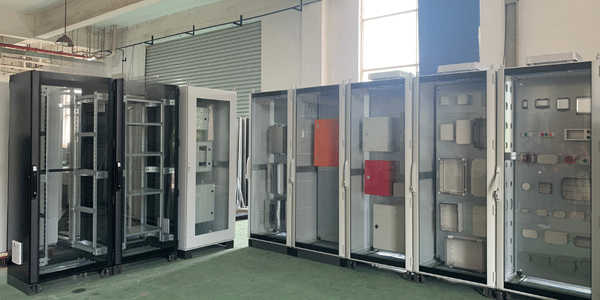Exploring the Impact of Electrical Fiberglass Boxes on Overall Project Efficiency
6/14/20243 min read


Introduction to Electrical Fiberglass Boxes
Electrical fiberglass boxes are enclosures used primarily to protect electrical connections and components. These boxes are crafted from fiberglass-reinforced plastic, a material known for its robustness and reliability. The primary uses of electrical fiberglass boxes span across various applications, including residential, commercial, and industrial electrical installations. Their primary function is to ensure the safety and integrity of electrical systems by shielding them from environmental and mechanical stresses.
One of the distinguishing features of fiberglass boxes is their lightweight nature. Unlike traditional metal enclosures, fiberglass boxes offer a significant reduction in weight without compromising on strength. This lightweight characteristic makes installation easier and more efficient, reducing labor costs and time. Moreover, the durability of fiberglass boxes is noteworthy. They exhibit high resistance to impact, corrosion, and UV radiation, which ensures longevity even in harsh environments.
Another critical aspect of electrical fiberglass boxes is their resistance to various environmental factors. These boxes are non-conductive, which enhances electrical safety, and they are also resistant to chemicals, moisture, and extreme temperatures. This makes them an ideal choice for outdoor and industrial applications where exposure to adverse conditions is a concern. Furthermore, fiberglass boxes are often designed to meet stringent industry standards and certifications, ensuring compliance and reliability in various settings.
The increasing adoption of fiberglass boxes in various industries can be attributed to these key characteristics. Industries such as telecommunications, utilities, and manufacturing are progressively turning to fiberglass enclosures to enhance the efficiency and reliability of their electrical systems. By understanding these fundamental attributes, one can appreciate how electrical fiberglass boxes contribute to overall project efficiency. As we delve deeper into the specifics, it becomes evident that these enclosures are not merely containers but integral components that can significantly impact the success and efficiency of electrical projects.
Advantages of Using Electrical Fiberglass Boxes
Electrical fiberglass boxes offer numerous advantages over traditional metal or plastic enclosures, making them a superior choice for various projects. One of the primary benefits is their non-conductive properties, which significantly enhance safety. Unlike metal enclosures that can conduct electricity and pose risks of electrical shock or short circuits, fiberglass boxes provide an added layer of protection, ensuring the safety of both the installation team and the end-users.
Another notable advantage of electrical fiberglass boxes is their remarkable durability. These boxes are highly resistant to corrosion, unlike metal enclosures that can deteriorate over time when exposed to moisture or chemicals. Fiberglass enclosures maintain their integrity even in harsh environmental conditions, such as extreme temperatures, high humidity, or saline environments. This durability ensures a longer lifespan, reducing the need for frequent replacements and maintenance, thus translating to overall cost-effectiveness for projects.
Cost-effectiveness is further enhanced by the ease of installation and customizability of fiberglass boxes. These enclosures are lightweight compared to metal alternatives, making them easier to handle and install. This ease of installation can significantly streamline project timelines, reducing labor costs and minimizing potential delays. Additionally, fiberglass boxes can be easily customized to fit specific project requirements, allowing for a tailored solution that meets unique needs without extensive modifications.
Real-world examples illustrate these benefits effectively. For instance, a coastal power plant upgraded its metal enclosures to fiberglass ones, resulting in reduced maintenance costs and improved reliability despite the corrosive salt-laden air. Similarly, a telecommunications company reported faster installation times and enhanced safety after switching to fiberglass boxes for their outdoor equipment. These case studies underscore the practical advantages of choosing fiberglass enclosures for various applications.
Impact on Project Efficiency
Electrical fiberglass boxes are becoming increasingly favored in various industries due to their significant contributions to project efficiency. One of the primary advantages of using electrical fiberglass boxes is the reduction in maintenance issues. Unlike traditional metallic enclosures, fiberglass boxes are resistant to corrosion and weathering, which markedly decreases the frequency of repairs and replacements. This inherent durability minimizes downtime, ensuring that projects remain on schedule and reducing the likelihood of unexpected delays.
Furthermore, the installation process of electrical fiberglass boxes is notably faster and more straightforward. Their lightweight nature simplifies handling and mounting, which in turn accelerates the installation phase. This rapid installation not only shortens project timelines but also lowers labor costs, contributing to overall project cost savings. The ease of customization offered by fiberglass boxes means that they can be tailored to specific project requirements without extensive modifications, further enhancing project efficiency.
Lower overall project costs are another significant benefit. The initial investment in electrical fiberglass boxes is often offset by the long-term savings on maintenance and labor. These cost efficiencies can be critical in competitive bidding environments, allowing firms to offer more attractive pricing or to allocate resources to other essential project areas. Additionally, the reliability and longevity of fiberglass enclosures mean that projects are less likely to encounter costly interruptions or defects, leading to higher-quality end results.
The long-term benefits of improved project efficiency extend beyond immediate cost and time savings. Increased reliability and reduced maintenance requirements lead to greater client satisfaction, as projects are completed on time and within budget while meeting high standards of quality. This positive client experience can result in repeat business and referrals, enabling firms to take on more projects and grow their portfolios. Industry testimonials underscore these advantages, with professionals frequently citing the enhanced efficiency and reliability provided by electrical fiberglass boxes.
